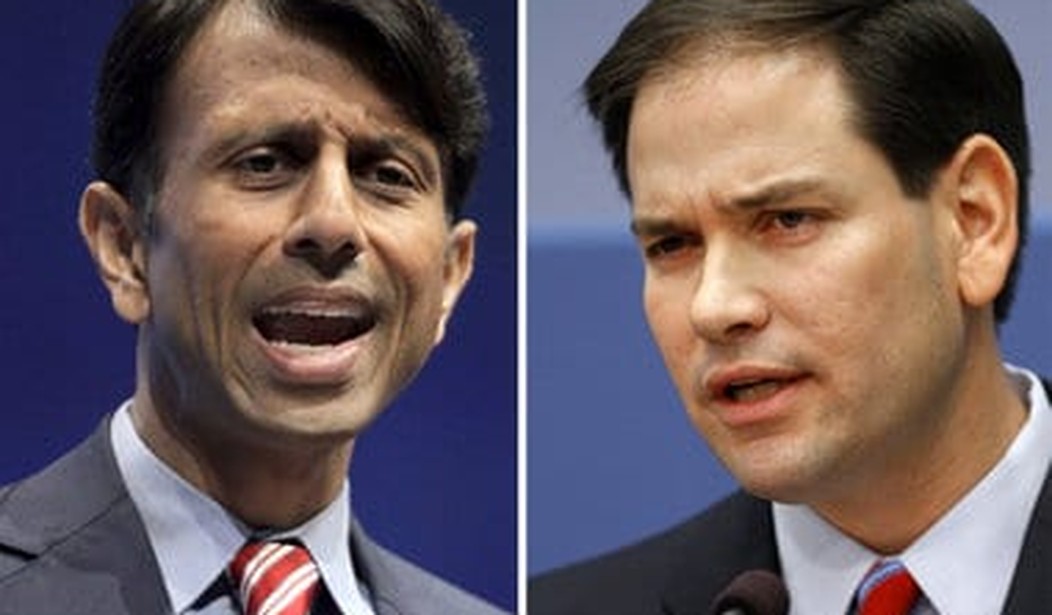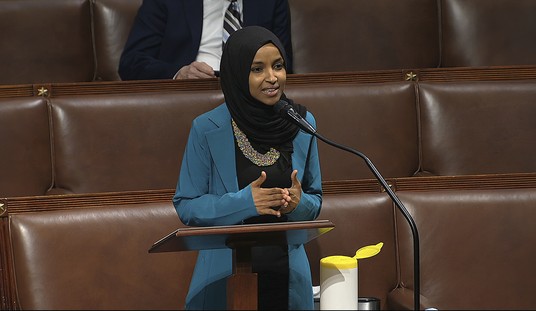Even Nate Silver would probably agree that if we fast-forwarded to the 2016 presidential campaign today, the probability is high that the GOP nomination would likely boil down to two candidates: Sen. Marco Rubio (R-Fla.) and Louisiana Gov. Bobby Jindal.
Even as pundits still analyze the minority voting numbers for Mitt Romney and debate how the Republican Party is going to reach out to voting blocs that weren’t always such a reach for the GOP (Bush got 44 percent of the Hispanic vote in 2004), these two guys are set to blow conventional notions of Republicans out of the water while simultaneously enjoying conservative support.
You could say that Rubio’s race began in the wee hours of election night, when about an hour after Romney’s concession speech he issued a press release that said he enjoyed spending time on the campaign trail with Romney, but “now comes the hard part.”
“I am committed to working on upward mobility policies that will ensure people who work hard and play by the rules can rise above the circumstances of their birth and leave their children better off,” Rubio said. “The conservative movement should have particular appeal to people in minority and immigrant communities who are trying to make it, and Republicans need to work harder than ever to communicate our beliefs to them. I look forward to working on these goals with my new and returning colleagues in Congress and hope the president will get behind our efforts.”
Rubio was working on a DREAM Act alternative this summer before Obama’s directive to cease enforcing immigration law against qualifying students.
Jindal’s race began with a shot last week at Romney.
“What the president, president’s campaign did was focus on certain members of his base coalition, give them extraordinary financial gifts from the government, and then work very aggressively to turn them out to vote,” Romney said in a mea culpa call with top donors.
The new chairman of the Republican Governors Association, at a press conference at the group’s meeting in Las Vegas, lashed out at the comments as “absolutely wrong.”
“One, we have got to stop dividing the American voters. We need to go after 100 percent of the votes, not 53 percent. We need to go after every single vote,” Jindal said. “And, secondly, we need to continue to show how our policies help every voter out there achieve the American dream.”
The governor wasn’t the only Republican to jump on these comments. Newt Gingrich, a onetime bitter primary rival of Romney’s who ended up supporting him in the main campaign, called the former Massachusetts governor’s comments “nuts” and “insulting.”
Jindal, a supporter of Texas Gov. Rick Perry during the primaries, was booked on Fox News Sunday, where he got to elaborate on his reaction that Republicans have “got to stop being the stupid party” making “stupid comments.”
“If we want people to like us, we have to like them first. And you don’t start to like people by insulting them and saying their votes were bought. We are an aspirational party,” Jindal said. “Let the Democratic Party be the party that says demography is destiny, that says we are going to divide people by race, by gender, by class.”
Failed GOP Senate candidates Richard Mourdock (Ind.) and Todd Akin (Mo.) also got a share of Jindal scorn for “saying stupid things” — each made different comments about abortion and rape that precipitated a fall in the polls and gave fuel to the Democrats’ “war on women” meme.
“Look, we had candidates in Indiana and Missouri that said offensive things that not only hurt themselves and lost us two Senate seats but also hurt the Republican Party across the board,” he said.
“I’m pro-life. I follow the teachings of my church and my faith,” Jindal, a practicing Catholic, added. “But at the same time, I think we can respect those that disagree with us. We don’t need to demonize those who disagree with us. We need to respect the fact that others have come to different conclusions based on their own sincerely held beliefs and have a civil debate.”
Rubio was kinder to Romney’s comments, saying in Iowa on Saturday that some people “have said that maybe the American electorate has changed, that what people want from government now is they’re just going to vote for whomever promises them more.”
“I don’t believe that’s true, I can’t believe that’s true,” he said. “Because if it’s true then the very nature of our country has changed forever. And that just can’t happen.”
Oh, and let’s repeat: He was in… Iowa.
Rubio ostensibly visited the early caucus state to wish a happy birthday to Iowa Gov. Terry Branstad. Between slices of cake and toasts, the senator got to deliver a stump speech laying out the Republican future that must include doing “a better job of going out and convincing our fellow Americans who perhaps don’t see things the way we do.”
You can also say that neither man got close enough to the Romney campaign for any lasting taint on their presidential ambitions. Each did some campaigning for the GOP nominee, but not any more or less than other big names in the party.
Each avoided landing on the Romney ticket and potentially combusting their own prospects, though Rubio was vetted as a running mate-in-waiting. Rep. Paul Ryan (R-Wis.) will have a nice long career in Congress, perhaps even be Treasury secretary one day, but the House Budget Committee chairman is forever connected to a ticket that couldn’t carry his home state.
After a stinging loss to a not-so-popular president in a struggling economy, you can expect that Republicans will not be so forgiving of Achilles’ heels in the 2016 selection process.
And it’s a pretty safe bet that the 2012 primary losers won’t be back for a second round — at least not with campaign strength that would see them through the season and to the nomination.
A door is opening wider for names that were floated as potential presidential and vice presidential candidates this time around — people who wisely passed in Obama’s re-election year.
Former Florida Gov. Jeb Bush has said many things of late about the Big Tent and the GOP; he also said 2012 was probably his best time if he wanted to run for president, but he may be more content in the party statesman role. George P. Bush, son of Jeb and Mexican-born Columba Bush, is 36 years old and considering a run for Texas land commissioner — and in several years, if he rises up in the ranks, the Bush name won’t be as damaging.
Stars who could rise a little nearer in the future include Wisconsin Gov. Scott Walker, Rep. Cathy McMorris Rodgers (R-Wash.), who will be moving into the No. 4 GOP leadership spot in the House in the 113th Congress, and Sens. Kelly Ayotte (R-N.H.) and John Thune (R-S.D.). Rep. Jeff Flake (R-Ariz.), a passionate pork-barrel-spending foe who forged a House version of comprehensive immigration reform with Rep. Luis Gutierrez (D-Ill.) in 2007, is also moving up into the Senate and could be in the spotlight. There are Govs. Bob McDonnell (R-Va.) and Chris Christie (R-N.J.), if the base forgives him for his pre-election Obama chumminess anytime soon. And bear in mind that Sen. Rand Paul (R-Ky.) could build an even more rabid presidential following than his retiring dad.
Four years is not only time to raise name recognition, but to establish oneself as a guiding force in the Republican Party by honing and even reforming the platform and policies to reflect the GOP’s core guiding principles.
But is step one brushing off any trace of, and even repudiating, Romney?
If so, Jindal is nicely out of the starting gate.
And he’s safely past his own foible, the lame and universally panned response to Obama’s 2009 address to a joint session of Congress. He’s wisely matured in office while those who cried “rising star!” have had to cool their heels.
The 41-year-old Jindal, born in Baton Rouge, is a Rhodes Scholar with degrees from Brown and Oxford. He has a background in healthcare administration that could come in valuable when promising to reform, replace, or repeal ObamaCare. He’s also been president of the University of Louisiana System — well-poised to talk education — and was elected to two terms in the U.S. House.
Jindal is now in his second term as governor. He’s married to New Delhi native and childhood friend Supriya Jolly; they have three children together. He’s made history as the first Indian-American governor and second member of Congress of this ethnicity.
Rubio, also 41 and Catholic, was born in Miami as the son of Cuban immigrants. He graduated from the University of Florida and the University of Miami School of Law. He rose to speaker of the Florida House of Representatives before famously ending Charlie Crist’s political career in the 2010 Senate elections. His wife, Jeanette Dousdebes, used to be a Miami Dolphins cheerleader (and is his best friend, according to his interview in the December issue of GQ); they have four children together.
When asked by GQ if he’s moving too fast, Rubio said, “For most of my life I’ve been in a hurry.”
“I don’t regret any of the choices I’ve made, but sometimes timing isn’t up for us to decide on taking some of the opportunities as they present themselves,” the senator said.









Join the conversation as a VIP Member